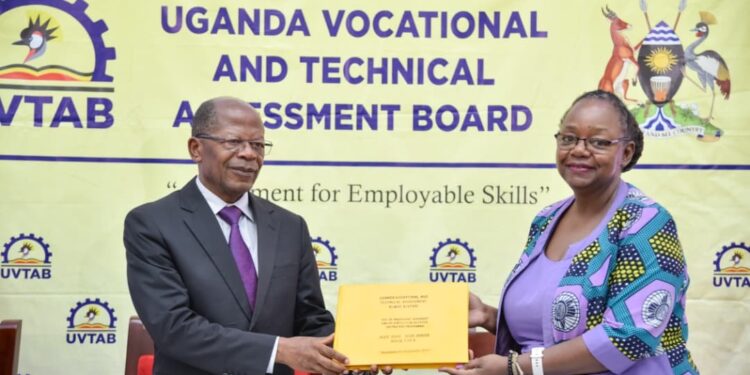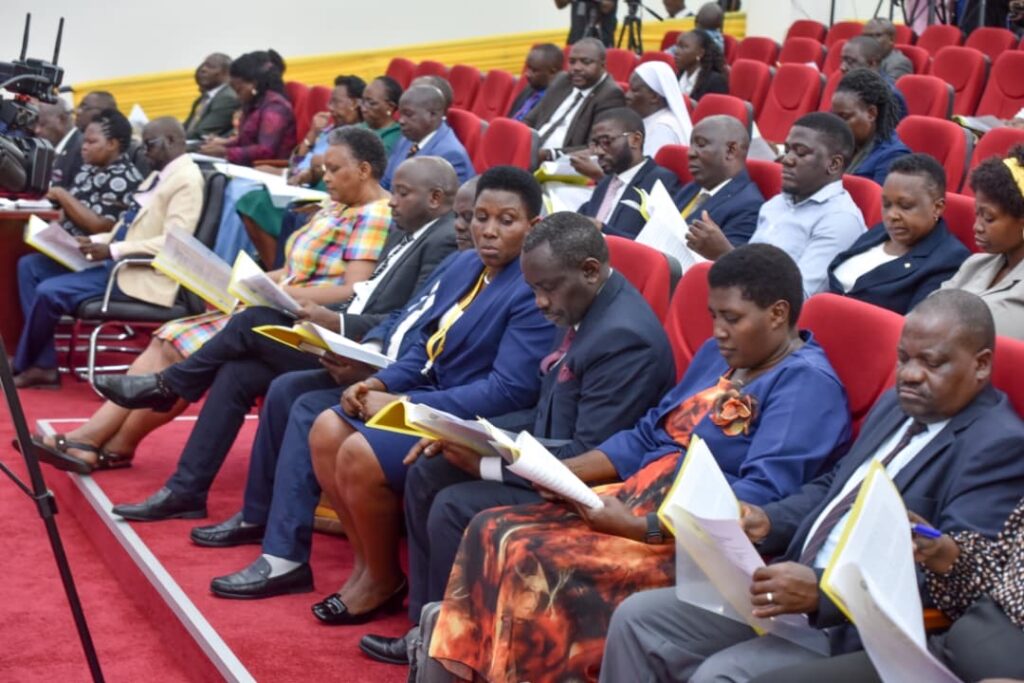
KAMPALA — The First Lady and Minister of Education and Sports, Hon. Janet Kataaha Museveni, has commended the significant progress achieved in Uganda’s Technical and Vocational Education and Training (TVET) reforms, highlighting the sector’s growing role in equipping citizens with employable and industry-relevant skills.
Speaking during the release of the May–June 2025 Uganda Vocational and Technical Assessment Board (UVTAB) examination results, Hon. Museveni—represented by the Minister of State for Higher Education, Hon. Dr. John Chrysestom Muyingo—praised the institutional reforms that are redefining Uganda’s skills development landscape.
“I am encouraged by the progress of TVET reforms and the establishment of the necessary agencies, including the TVET Council and the Assessment Boards,” she said. “These institutions are central to implementing the new TVET Act, 2025, which came into force in March this year, and will ensure efficiency in regulation, training delivery, and assessment.”
Hon. Museveni emphasized the importance of strong collaboration with industry players, professional associations, and international partners to ensure that Uganda’s vocational training remains competitive and aligned with global standards.
“Industry engagement ensures our training curricula stay relevant, producing professionals capable of meeting both national and international labour demands,” she noted.
She also congratulated the UVTAB Board, chaired by Prof. Eng. Dorothy Okello, for the milestones achieved since its formation in July 2025, and applauded the Ministries of Education and Public Service for successfully validating the Board’s staffing structure.

Highlighting the outcomes of the 2025 assessment, Hon. Museveni celebrated the increasing participation of women in vocational training programs.
“Of the 24,116 candidates who completed their assessments successfully, 14,188 were women,” she revealed. “This reflects our collective progress toward gender equality in skills development.”
The First Lady described the achievement as evidence of Uganda’s growing commitment to empowering youth with practical skills that support the country’s industrialization and economic transformation agenda.
She lauded the establishment of UVTAB’s National Skills Assessment Centre, calling it a vital investment in quality assurance, innovation, and research for vocational education.
“Once fully operational, the Centre will strengthen our capacity to uphold standards, enhance quality assessments, and guarantee credibility in certification,” she said.
Hon. Museveni further urged the TVET Council to expedite the rollout of the TVET Qualifications Framework, which will create clear career pathways, promote recognition of skills by employers, and improve labour mobility.
Reaffirming the government’s dedication to vocational education, the First Lady outlined several ongoing projects under the NRM administration aimed at expanding access to quality education and training.
She cited the Uganda Refugee and Host Communities Project, worth USD 8.7 million, which is rehabilitating and equipping Skills Development Centres in Inde (Madi-Okollo), Omugo (Terego), and Buhungiro (Isingiro), alongside the ongoing rehabilitation of nine additional technical institutes, including Lutunku, Kabale, St. Kizito (Masaka), Nkoko, Nalwire, Moroto, Moyo, and Birembo Memorial.
The government is also expanding access to secondary and teacher education through initiatives such as the Uganda Secondary Education Expansion Project (USEEP) and the Uganda Learning Acceleration (ULEARN) program—projects that collectively target the construction, expansion, and rehabilitation of hundreds of schools and teacher training institutions nationwide.
“These developments demonstrate our government’s enduring commitment to inclusive, equitable, and quality education,” Hon. Museveni affirmed.
She called for continued engagement with international accreditation bodies and development partners to integrate global best practices and expand opportunities for Ugandan trainees to work abroad.
In her closing remarks, she congratulated all successful candidates and their families, describing them as the foundation of Uganda’s future skilled workforce.
“Your hard work and resilience are shaping the future of this country,” she said. “You are the backbone of Uganda’s development.”
Breakdown of the May–June 2025 UVTAB Assessment Results
Presenting the results earlier, Mr. Onesmus Oyesigye, Executive Secretary of UVTAB, reported steady progress in vocational skills development across the country. The assessments were conducted from May 2 to June 27, 2025, across 499 centres nationwide—306 for formal TVET programs and 193 for candidates trained through informal or non-institutional means.
A total of 30,291 candidates registered for the assessments, comprising 17,245 females (57%) and 13,046 males (43%). Of these, 26,610 (88%) sat for the exams, and 24,116 (91%) successfully attained full competences.
Informally trained candidates recorded the highest completion rate at 96%, compared to 81% among those from formal training institutions. Female candidates outperformed their male counterparts, with 92% achieving full competence compared to 89% of males.
By discipline, Technology Education and Training attracted the most enrolment (48%), followed by Home Science Education (29%), Business Education (15%), and Agriculture Education (8%).
Additionally, 109 special needs candidates participated, of whom 83% achieved full competences.
“The overall performance has been commendable, with most programs posting completion rates above 75 percent,” Mr. Oyesigye noted. “We remain committed to maintaining integrity, inclusiveness, and industry alignment in all our assessments.”